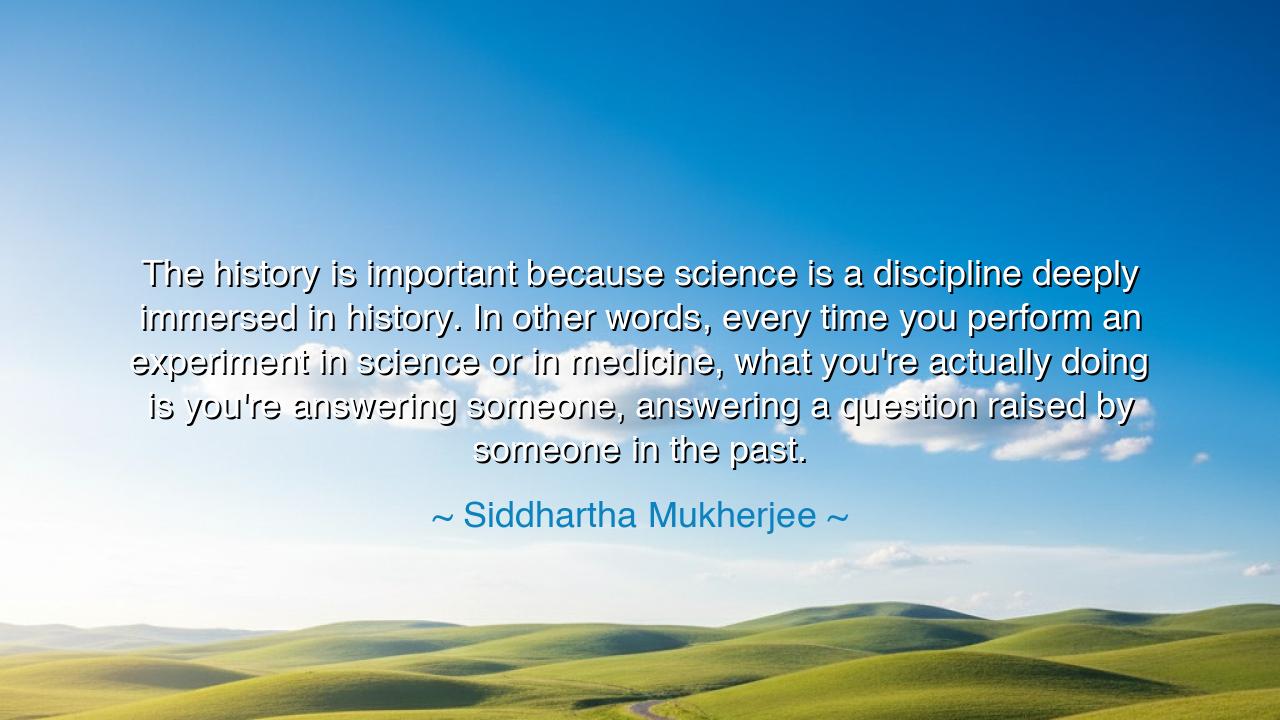
The history is important because science is a discipline deeply
The history is important because science is a discipline deeply immersed in history. In other words, every time you perform an experiment in science or in medicine, what you're actually doing is you're answering someone, answering a question raised by someone in the past.






"The history is important because science is a discipline deeply immersed in history. In other words, every time you perform an experiment in science or in medicine, what you're actually doing is you're answering someone, answering a question raised by someone in the past." These words from Siddhartha Mukherjee carry a profound truth: the pursuit of science and medicine is not an isolated endeavor, nor is it a break from the past. Rather, it is a continuous dialogue across time, a conversation with the ancient minds that have shaped our understanding of the world. Every experiment, every discovery, is not merely an answer to a new question, but a response to the questions of those who came before us. Science and medicine stand on the shoulders of giants, each new discovery a link in an unbroken chain of inquiry, stretching back to the dawn of human curiosity.
In the ancient world, the pursuit of knowledge was always intertwined with the recognition of the past. Plato believed that the pursuit of wisdom was not just about discovering new truths but about understanding the great works of those who came before. Aristotle, in his systematic study of nature, built upon the ideas of earlier thinkers, refining and expanding their theories. The philosophers and scientists of the ancient world did not see themselves as isolated individuals but as participants in a larger intellectual tradition—a tradition that spanned centuries. They were answering questions posed by their predecessors, shaping their ideas and contributing to the ever-evolving understanding of the natural world.
The great scientists of the Renaissance, such as Galileo Galilei and Leonardo da Vinci, were not simply inventing new concepts; they were answering questions raised by the ancients. Galileo, with his telescope, did not simply discover the moons of Jupiter; he answered the questions raised by Copernicus and Kepler, furthering the understanding of the heliocentric model. Da Vinci was not just a painter but a scientist whose anatomical studies answered the questions that had been asked for centuries about the human body. His works, though centuries old, still shape modern medicine and biology, showing that every inquiry is connected to those who came before, and every answer leads to more questions for those who follow.
Mukherjee’s statement also draws attention to the essential role of history in the progress of science and medicine. Each experiment, whether in a lab or a hospital, is part of a grand tapestry that connects us to the great minds of the past. In medicine, every treatment, every cure, is an answer to the questions raised by those who studied the human body before us. The discovery of penicillin by Alexander Fleming was not just a singular achievement; it was the culmination of centuries of medical inquiry, following in the footsteps of figures like Hippocrates, who first sought to understand the causes of disease. In the history of medicine, each new breakthrough is an answer to the age-old question: How can we heal? And in answering it, we propel ourselves closer to understanding the human condition.
Think of Marie Curie, whose groundbreaking work in radioactivity changed the course of science and medicine. Curie did not discover radium in isolation; her work was built on the findings of Henri Becquerel and Pierre Curie, and it was a continuation of the work done by the great minds of chemistry and physics before her. In every experiment, Curie was answering the questions posed by earlier scientists, expanding upon their discoveries, and opening new doors to knowledge. Her work exemplifies the progression of science—a constant dialogue with the past, a never-ending chain of questions and answers that moves humanity forward.
In Siddhartha Mukherjee’s words, we are reminded that science is not a solitary journey but a shared enterprise across generations. Each discovery is part of a larger conversation, and every experiment we conduct is an act of respect for the questions that have been asked before. The progress of science is not linear but cyclical—each generation stands on the shoulders of the last, using the knowledge of the past to answer the questions of the present and raise new ones for the future. History, then, is not merely a record of what has been but a living part of science’s progression, always informing the questions we ask and the answers we seek.
The lesson here is simple: science and medicine are not isolated practices but are part of a grand tradition of inquiry, passed down through time. Every question we ask, every experiment we perform, is a response to the work of those who came before us. As we advance in our understanding of the world, we must never forget the debt we owe to the pioneers of science and medicine. They have shaped the questions we ask and the answers we seek, and we, in turn, will pass our discoveries on to future generations. In this way, knowledge is alive, always growing, always evolving, and always connected to the past.
Therefore, let us approach the pursuit of knowledge with humility and reverence for those who have come before us. Every experiment, every breakthrough, is not just a step forward for us, but a continuation of the great human story of discovery. Science is a living, breathing dialogue, and it is through our engagement with the past that we are able to shape a better future. Let us honor the history of science and carry the torch of inquiry forward, always seeking, always learning, and always answering the questions raised by those who have paved the way before us.






AAdministratorAdministrator
Welcome, honored guests. Please leave a comment, we will respond soon